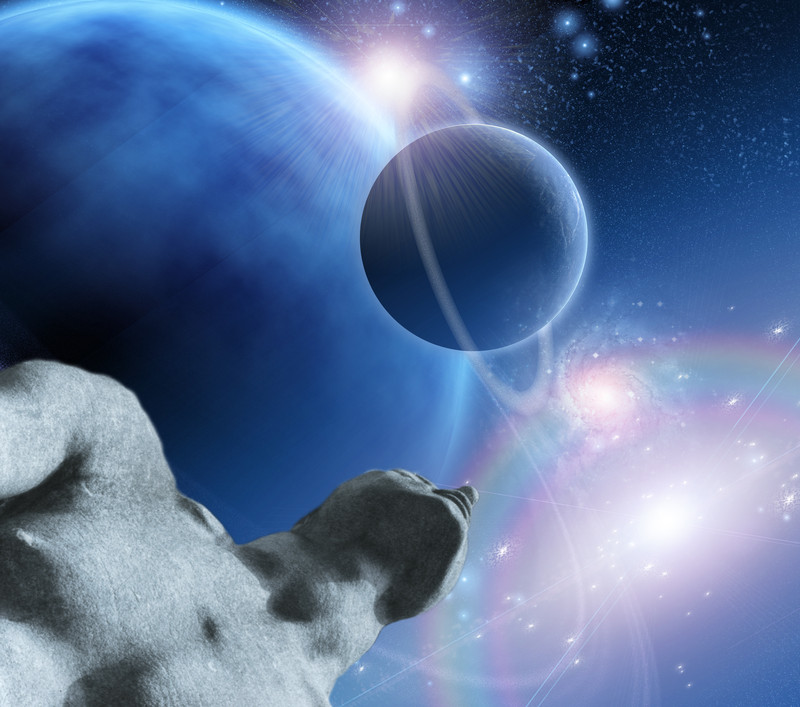Life and Death
Recently I read with fascination an article on simple life forms that can survive the harsh environment of space. British scientists are claiming that they discovered single cell algae, Diatoms, living sixteen miles above the Earth. They were discovered when specialized balloons were sent up to collect data on the Perseid meteor shower. Some of the scientists believe these Diatoms are of Earth origins and somehow managed to reach the stratosphere by air currents sweeping over the ocean and rising, but others are positing it may be our first encounter with alien life, further hypothesizing these “aliens” might explain how life started here. Did comets laden with super resilient single cell organisms travel countless light years to slam into our planet and seed it with our far distant ancestors?
Another article spoke of Russian astronauts cleaning the exterior of the International Space Station and discovering living organisms attached to the body of the station. Again it looks like an Earth origin from the ocean, but it introduces the intriguing idea that organic life can survive in extremely unfriendly conditions.
A good candidate for surviving space travel would be the Tardigrade or “Waterbear”, a fairly complex tiny life form that can be found thriving just about everywhere on Earth. It has been classified as an “extremophile”, and for good reason. It can withstand most anything Mother Nature throws at it, from temperatures of -250 degrees Celsius to far above the boiling point of water, atmospheric pressures greater than anything on Earth, deadly radiation and the airless vacuum of space! A tough little bugger, indeed.
The Tardigrade can last up to ten years without food or water and can suspend their metabolism, self-dehydrate 99 percent and hibernate for that time and rehydrate when it comes in contact with water. Perhaps a Tardigrade or a similar creature was dislodged from the surface of Mars by a meteor impact and made the relatively short trip to Earth and got the party started.
This doesn’t answer the big question of how life started in the first place, but it could explain its humble beginnings on our little blue ball. One of the reasons this news resonated with me is it gives me hope that life isn’t just a flash in the cosmic pan and may not be strictly isolated to our little galactic outback. It means organic life could spread throughout space in the same fashion as all other matter zooming around out there.
I don’t think I’m alone when I say I am a big fan of life and the pain and joy our consciousness and self-awareness brings. What a gift! But are we worthy of it? Will we get the opportunity to evolve as a species that can live in harmony with our fellow earthlings of all types and descriptions? Or will we continue in arrogance to disrespect and defile Mother Earth and do ourselves in, either directly or indirectly, before we get the chance? I wish I didn’t have to ask these questions, but we are a dismal failure in the stewardship department and have taken the Judeo/Christian biblical “dominion over all things” much too literally.
The discovery of these hardy creatures is welcome news; that life may not be limited to our little Petri dish, but everywhere growing and evolving with better than good odds of success. I can hear Carl Sagan…. billions of galaxies, each with billions of stars, each with planetary systems makes for good odds that we are not alone. Still, it is a miracle that we have made it this far. Every little cosmic bump here and nudge there that has added up to our present state could just as easily have ended our progression to global dominance.
Somehow, somewhere there may be worlds similar to ours whose inhabitants have reached a level of intelligence or a different kind of intelligence that allows them to live in a culture devoid of avarice and envy, a culture in harmony with ALL life forms and an overwhelming gratitude for their existence. This thought brings me comfort. To paraphrase Star Wars, “May the odds be with you.”
A Tardigrade [From Youtube: AkiraFlickr]
~~~~~~~~~~~~~~~~
Alex lives with his wife, Anna in Key West, Florida. He enjoys writing poetry and prose and making the complacent uncomfortable.
More From Other Sources:
http://en.wikipedia.org/wiki/Tardigrade
http://www.blastr.com/2013-9-20/british-scientists-claim-have-harvested-alien-organisms-space

